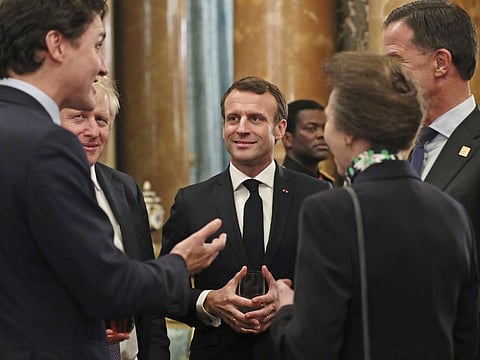A crisis of leadership for Nato
Opportunists and disrupters will take advantage of the alliance’s disunity and discord

In the intervening years between the ends of the Second World War and the Cold War, it used to be that the leadership of the North Atlantic Treaty Organisation (Nato) was united in opposing the military might of the Soviet Union.
Now, after a Nato summit in London to mark 70 years of the alliance, it seems as if mere words over canapés are enough to unsettle the once-mighty alliance and air very publicly the lack of unity in its current leadership.
There is a very long, deep and successful history here that needs to be remembered — that the unity of nations reaching across the Atlantic from western Europe to North America endured through the expansions of atomic arsenals and the Cuban Missile Crisis, and effectively ended the Cold War without a shot being fired.
And this came at a time when massed battle tanks, men and artillery faced off across an Iron Curtain that fell the length of Europe.
Macron has questioned Nato’s raison d’etre, challenging it as “brain dead”, while the UK believes Russia remains an imminent existential threat. These divisions of outlook also underscore divisions within Nato ranks, where Turkey tempers concerns over the Baltic and east European states by allying itself with RussiaGulf News
Nato was united too in formulating a response when the US was attacked on 9/11. Now, Nato at 70 finds itself unable to unite in a common cause — whether that cause be as a response to what remains of Daesh, an interfering Russia or a China rising in the Far East.
Since coming to power in the US, President Donald Trump has agitated Nato states by insisting they abide by a commitment to increase military spending by 2 per cent. President Emmanuel Macron of France has questioned Nato’s raison d’etre, challenging it as “brain dead”, while the UK believes Russia remains an imminent existential threat. These divisions of outlook also underscore divisions within Nato ranks, where Turkey tempers concerns over the Baltic and east European states by allying itself with Russia in Syria and buys Russian air defence systems.
This is the state of Nato as it turns 70 — now more like a disengaged social club than a military alliance focused on a common purpose and united by a mutual defence pact. It seems as if Nato’s most prominent leaders only attack each other, exchanging tittle-tat instead of intelligence over cocktails, where personal standing is to be protected rather above the security and unity of the West.
As long as the current crop of leaders fail to see the strategic importance of a strong military alliance, the forces of disruption and opportunism will take advantage. That is what’s important — not posturing on or off social media.



